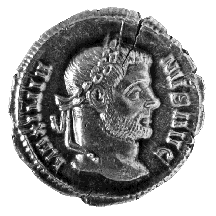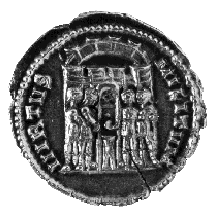



(125) Maximian - AR argenteus, c. A.D. 294, 2.79
g. (inv. 91.236).
Obverse: Laureate head of Maximian r.; MAXIMIANVS AVG(VSTVS):
Maximianus Augustus.
Reverse: Tetrarchs sacrificing over tripod before arch
in eight-turreted enclosure; VIRTVS MILITVM: the valour of the army.
Provenance: Fred Knobloch, 1968.
Bibliography: C.H.V. Sutherland, The Roman Imperial
Coinage VI: from Diocletian's reform (A.D. 294) to the death of Maximianus
(A.D. 313) (London 1967) Siscia 32b.
When Diocletian was proclaimed emperor in A.D. 284, he put Maximian in charge
of the West and quickly elevated him first to the rank of Caesar and then
to Augustus. Maximian dealt with German invasions and rebellion in Gaul
while Diocletian remained in the East to fight the Persians. In A.D. 293
Diocletian put into effect his plan to reorganize and stabilize the administration
of the empire and to strengthen its frontiers by establishing the tetrarchy
or rule of four, in which there were to be two senior emperors, the Augusti,
and two junior colleagues, the Caesares, each of whom was assigned responsibilty
for one area of the empire. Diocletian and Maximian remained the Augusti,
and Diocletian appointed Constantius and Galerius Caesares. The next year
he introduced major financial reforms, including important changes in the
coinage, one of which was the introduction of a fine silver coin called
the argenteus. This coin is a typical example of the new denomination.
Most of the types on the argentei are military, designed to appeal to the
troops that were paid with the coins. The obverse portrait of Maximian is
the typical military type with short hair and beard; the type on Diocletian's
coins is virtually identical, the similarity probably a means of expressing
the concord and unity of the tetrarchs. The same idea is conveyed by the
reverse, on which the four rulers sacrifice together before a gateway fortified
with towers.
B.H.



All contents copyright (c) 1996.
Lawrence University
All rights reserved.